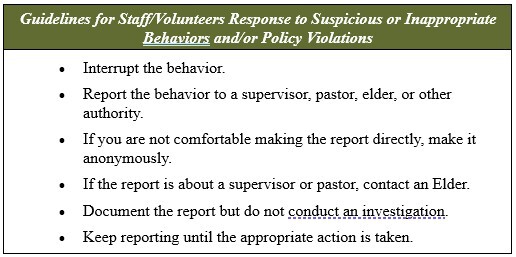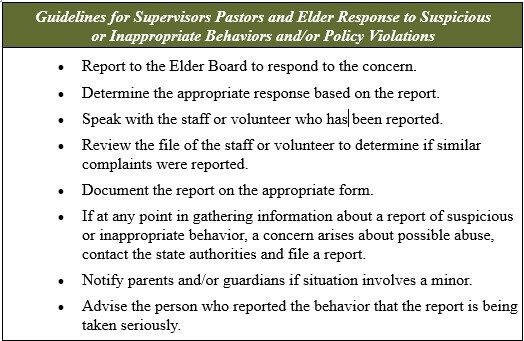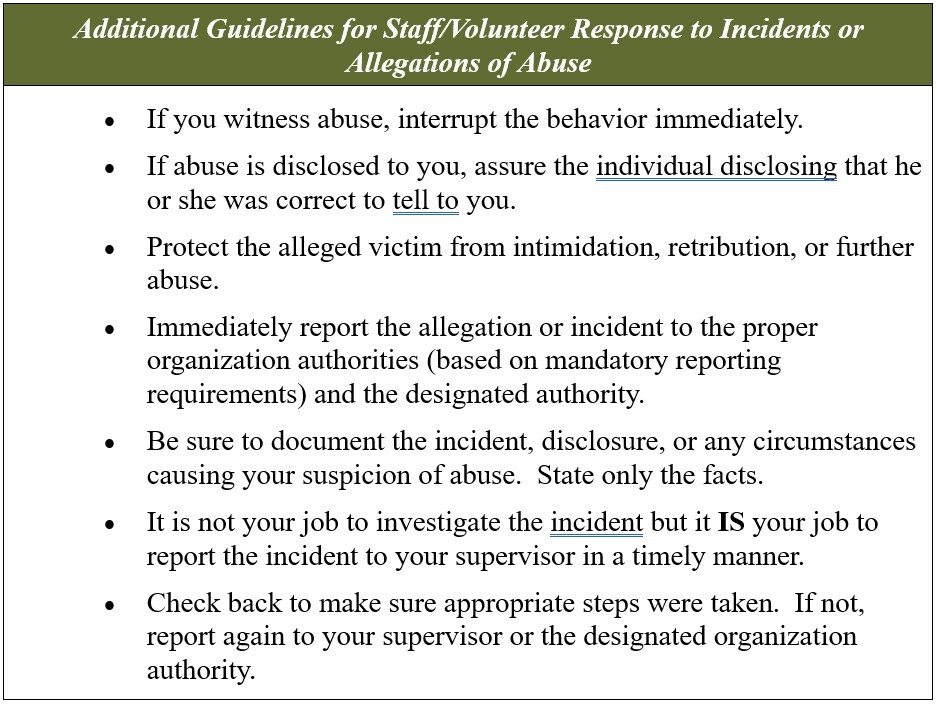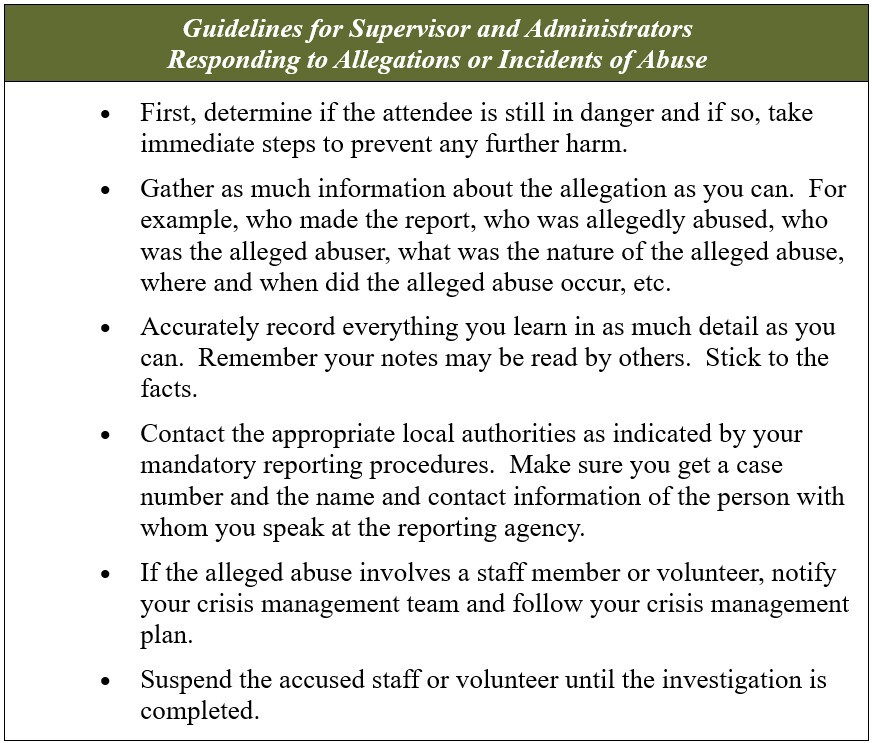Calvary Baptist Church Abuse, Mistreatment, and Bullying Policy
Calvary Baptist Church Abuse, Mistreatment, and Bullying Policy
Purpose:
Calvary Baptist Church is committed to maintaining a safe, respectful, and nurturing environment for all individuals, especially those participating in our programs. This policy aims to ensure the safety and well-being of all individuals while promoting an atmosphere of Spiritual growth, kindness, respect, and support.
Calvary Baptist Church is committed to maintaining a safe, respectful, and nurturing environment for all individuals, especially those participating in our programs. This policy aims to ensure the safety and well-being of all individuals while promoting an atmosphere of Spiritual growth, kindness, respect, and support.
Policy Statement:
Calvary Baptist Church has a strict policy for abuse, mistreatment, inappropriate sexual activity, bullying in any form by those acting with agency of Calvary Baptist Church toward any individual involved in the Church’s Programs, other staff or volunteers. If a violation of this policy occurs, based on the severity of the infraction, one or more of the following actions will be taken: counseling/restoration, disciplinary action, removal from the program, and/or termination of employment.
Calvary Baptist Church has a strict policy for abuse, mistreatment, inappropriate sexual activity, bullying in any form by those acting with agency of Calvary Baptist Church toward any individual involved in the Church’s Programs, other staff or volunteers. If a violation of this policy occurs, based on the severity of the infraction, one or more of the following actions will be taken: counseling/restoration, disciplinary action, removal from the program, and/or termination of employment.
General Definitions
Types of abuse
- Physical abuse is injury that is intentionally inflicted upon a consumer.
- Sexual abuse is any contact of a sexual nature that occurs between a attendee and a staff member or church approved volunteer. This includes any activity which is meant to arouse or gratify the sexual desires of the staff member or church approved volunteer.
- Emotional abuse is mental or emotional injury to an attendee that results in an observable and material impairment in the attendee’s growth, development, or psychological functioning.
- Neglect is the failure to provide for a attendee’s basic needs or the failure to protect a attendee from harm.
Code of Conduct with Attendees
The following policies are intended to assist staff and volunteers in making decisions about interactions with attendees. For clarification of any guideline, or to inquire about behaviors not addressed here, contact the Pastors or Elders.
Our Church provides our attendees with the highest quality services and programs available. We are committed to creating an environment for attendees that is safe, nurturing, empowering, and that promotes spiritual growth and success.
No form of abuse will be tolerated and confirmed abuse will result in immediate discipline up to and including dismissal from our organization. All reports of suspicious or inappropriate behavior with attendees or allegation of abuse will be taken seriously. Our organization will fully cooperate with authorities if allegations of abuse are made that require investigation.
The Conduct with Attendees outlines specific expectations of the staff and volunteers as we strive to accomplish our God given mission together.
- Attendees will be treated with respect at all times.
- Attendees will be treated fairly regardless of race, sex, sexual orientation, gender identification, age, or religion. With a goal being full repentance for any scriptural sin which may exist.
- Staff and volunteers will adhere to uniform standards of displaying affection as outlined by our church.
- Staff and volunteers will avoid affection with Attendees that cannot be observed by others.
- Staff and volunteers will adhere to uniform standards of appropriate and inappropriate verbal interactions as outlined by our church.
- Staff and volunteers will not stare at or comment on attendees’ bodies.
- Staff and volunteers will not use or be under the influence of alcohol or illegal drugs in the presence of attendees.
- Staff and volunteers will not have sexually oriented materials, including printed or online pornography, on our organization’s property.
- Staff and volunteers will comply with our church’s policies regarding interactions with attendees outside of our programs.
- Staff and volunteers will not engage in inappropriate electronic communication with attendees.
- Staff and volunteers will not abuse attendees in any way including (but not limited to) the following:
- Physical abuse: hitting, spanking, shaking, slapping, unnecessary restraints
- Verbal abuse: degrading, threatening, cursing
- Sexual abuse: inappropriate touching, exposing oneself, sexually oriented conversations
- Mental abuse: shaming, humiliation, cruelty
- Neglect: withholding food, water, shelter
- All staff must follow state specific mandatory reporting requirements. Staff should be trained to be aware of and understand their legal and ethical obligation to recognize and report suspicions of mistreatment and abuse. Staff will:
- Be familiar with the symptoms of child abuse and neglect, including physical, sexual, verbal, and emotional abuse.
- Know and follow organization policies and procedures that protect attendees against abuse.
- Report suspected child abuse or neglect to the appropriate authorities as required by state mandated reporter laws.
- Follow up to ensure that appropriate action has been taken.
- Staff and volunteers will report concerns or complaints about other staff, volunteers, adults, or attendees to your immediate supervisor, a Pastor or Elder.
- Our church cooperates fully with the authorities to investigate all cases of alleged abuse. Any staff or volunteer shall cooperate to the fullest extent possible in any external investigation by outside authorities or internal investigation conducted by the church or persons given investigative authority by the church. Failure to cooperate fully may be grounds for termination.
- Staff and volunteers who have engaged in or been accused or convicted of abuse, indecency with a consumer, or injury to any person, may not serve in children’s ministries. They may serve in a team environment in other areas of ministry.
Policies
Policies define the bandwidth of acceptable behavior in the church. Because offenders often violate policies to gain access to attendees, when staff know and understand policies, they can identify, interrupt, and report policy violations. Simply interrupting a policy violation can prevent a false allegation of abuse or put an offender on notice that no one works in private, the rules apply to everyone, and violations will be detected.
Background Checks
Background checks will be completed prior to a staff member officially receiving a offer for employment. All members of the Elder Board and Deacon Board, all volunteers that work with minors or handling of the money or finances of the church will also have background checks completed prior to the volunteer being able to complete any of the volunteer duties. The background checks will be completed through Planning Center using the Checkr service that includes SSN trace, Sex Offender Register Check, Global Watchlist check, National Criminal Records check and Unlimited County Criminal Records Check. All staff and volunteers are required to complete a background check once every three years, unless there is reason for the Elder Board to believe that an individual should have a background check completed earlier.
Physical Contact
Our church’s physical contact policy promotes a positive, nurturing environment while protecting attendees and staff. Our church encourages appropriate physical contact with attendees and prohibits inappropriate displays of physical contact. Any inappropriate physical contact by staff or volunteers towards attendees in the church’s programs will result in disciplinary action, up to and including termination of employment.
Interaction
Staff and volunteers are prohibited from speaking to attendees in a way that is, or could be construed by any observer, as coercive, threatening, intimidating, shaming, derogatory, demeaning, or humiliating. Staff and volunteers must not initiate sexually oriented conversations with attendees. Staff and volunteers are not permitted to discuss their own sexual activities with attendees.
One-on-One Interaction
Most abuse occurs when an adult is alone with a attendee. Our organization aims to eliminate or reduce these situations and prohibits private one-on-one interactions with minors or someone of the opposite sex unless it is a confidential counseling situation. All other counseling will have at least one other adult present in the room or in the immediate area.
- Individual Counseling:
One-on-one situations, such as individual counseling sessions, introduce additional risks for false allegations. Staff and volunteers should be aware of our policies regarding individual counseling:
- Pastors and Elders must notify one other Pastor or Elder of any private counseling sessions.
- Pastors and Elders must keep a schedule of any private counseling sessions, which should include times, attendees involved, and location of sessions. This log will be available and open for review by another Pastor or Elder.
Gift Giving
Molesters routinely groom victims by giving gifts, thereby endearing themselves to the victim. They might instruct the victim to keep the gifts a secret, which then starts teaching the victim to keep secrets from parents/guardians. For this reason, staff and volunteers should only give gifts to groups of attendees, and only under the following circumstances:
- Administration must be made aware of and approve the gift.
- Parents/guardians must be notified.
Training Requirements
All staff and volunteers will be required to read this policy upon instatement of their employment or ministry serving and will be required to review it annually. All staff and volunteers will also be required to complete the Foundations: Preventing Abuse in Youth-Serving Organization from the Praesidium Academy upon instatement of their employment or ministry serving and to complete a review of the course annually.
Monitoring and Supervision
When staff and volunteers are adequately supervised, potential offenders are less likely to act on their impulses because they face detection. When attendees are adequately supervised, they too are less likely to engage in inappropriate interactions with others. Similarly, the physical building must be monitored, particularly out-of-the-way locations or locations that might permit an offender undue access to or privacy with a attendee. Effective supervision and monitoring require that a variety of methods be used frequently, at both scheduled and random times.
Facility Monitoring
Building architecture can increase or mitigate the risk of an incident or accident. Because most incidents of sexual behavior occur in private, the extent to which privacy is managed, risk is managed. In order to ensure that all of the locations are properly and consistently monitored, designate a staff member who must complete a site inspection checklist.
Checking Members into a Facility:
- When anyone (members, guests, construction workers, maintenance, cleaning crews, etc.) enters the facility during operational hours, they must check in with the front desk.
- When possible, create a single point of entry and exit in the facility.
- If there is more than one entrance or exit, ensure these other points of access are consistently monitored and locked at appropriate times.
General Supervision
General supervision procedures:
- Administrative and Supervisory Visits to Church Programs- Elders will regularly visit all church programs to ensure that all activities are well- managed and that church policies are observed by all in attendance.
- Ratios- Each program will follow the ratio requirements that are directly to the goals of the program and the design of the program area. The staff or volunteer-to-attendee ratio should be adjusted for programs that serve attendees with special needs. Refer to local licensing requirements and general best practice guidelines for establishing adult-to-attendee ratios. All programs involving minors (Ages 17 and under) will require a minimum of two adults in the room while supervising the program.
Responding to Suspicious or Inappropriate Behaviors or Policy Violations
Because our organization is dedicated to maintaining zero tolerance for abuse, it is imperative that every staff member actively participates in the protection of attendee. In the event that staff observe any suspicious or inappropriate behaviors and/or policy violations on the part of other staff or volunteers, it is their personal responsibility to immediately report their observations.
Remember, at our organization, the policies apply to everyone.
Remember, at our organization, the policies apply to everyone.

All reports of suspicious or inappropriate behavior with attendees will be taken seriously. Our procedures will be carefully followed to ensure that the rights of all those involved are protected.
Staff and Volunteer Response:
If staff or volunteer witness suspicious or inappropriate behaviors or policy violations from another staff or volunteer, the staff or volunteer is instructed to do the following:

Supervisor and Administrator Response:
In the event that a supervisor, pastor or an Elder receives a report of suspicious or inappropriate behaviors or policy violations from a staff member or volunteer, the supervisor is instructed to do the following:

Based on the information gathered, the following may be required:
- Increase monitoring or supervision of the staff, volunteer, or program.
- If policy violations with attendees are confirmed, the staff or volunteer must be subject to disciplinary action up to and including termination and prosecution. Disciplinary action will follow the Progressive Disciplinary Process outlined in this manual.
If more information is needed, interview and/or survey other staff and volunteers or attendees.
Organizational Response:

Responding to Suspected Abuse by an Adult
Staff or Volunteer Response to Abuse:
As required by mandated reporting laws, staff and volunteers must report any suspected abuse or neglect of a attendee—whether on or off organization property or whether perpetrated by staff, volunteers, or others—to state authorities. Reports may be made confidentially or anonymously. A person who mistakenly reports suspected abuse is immune from civil or criminal liability as long as the report was made in good faith and without malice
In addition to reporting to state authorities, staff and volunteers are required to report any suspected or known abuse of attendees perpetrated by staff or volunteers directly to leadership so that immediate and proper steps may be taken to ensure the safety of alleged victims and others who may be at risk. Reports of suspected or known abuse may be made confidentially to the following:
- Immediate supervisor
- Pastors
- Elders

Supervisors and Administrators Response to Abuse:
In addition to the above response procedures, supervisors and administrators should ensure the following:

Sample Critical Incident Management Plan
Prior to Allegation/Incident
- Determine who from your Organization will be on the Critical Incident Management Team.
- Educate all employees and volunteers on what to do if someone alleges current or historical abuse involving a church employee or volunteer.
- All employees and volunteers should know how to fulfill their duties as mandated reporters (if they are mandated reporters according to state law).
- All employees and volunteers should be trained on how to complete the appropriate critical incident forms for Calvary Baptist Church.
Immediate Safety
- Follow all mandated reporting requirements and contact the authorities as appropriate.
- Where applicable, prevent the accused from having further access to children until a thorough incident review is completed. Before beginning an internal incident review, verify with local authorities that this will not interfere with their investigation.
- If the accused person is an employee, follow progressive discipline procedures accordingly. This may involve suspending the accused during the investigation.
- When applicable, notify other employees.
Initial Communication Plan
- Designate a point person to respond to all inquiries from parents, the media, and other stakeholders.
- Prepare a short media statement in advance of getting a media inquiry.
- All oral and written communication should speak with a voice of compassion and confidence.
- All employees and volunteers should know how to refer media inquiries to the appropriate person.
- As soon as possible, meet in person (not over the phone) with identified victims and their parents/guardians.
- Reassure them that you are taking this seriously.
- Find out what response they expect and be prepared to explain the support you will offer, such as counseling.
- Consider reaching out in writing to parents/guardians of all children currently attending the church as well as those with past contact with the accused offender.
- The message should communicate:
- Empathy: Begin by stating that such incidents run counter to the Church’s values.
- Facts: Include a summary of the incident, including information about the arrest, suspension, investigation, etc.
- Contact Request. Ask parents to contact you or the specified authorities if they suspect their child may have been abused.
- Your Response: Explain that you are fully cooperating with the authorities. Describe proactive steps you are taking such as offering resources to parents, hosting a parent meeting, training staff, and conducting an independent investigation to learn from this incident so you can prevent it from happening again.
- The message should communicate:
- Host a parent/guardian meeting to speak directly with concerned families and directly answer any questions before rumors or misinformation is spread.
- Communicate as much information as you can about the incident.
- Provide information regarding the proactive steps leadership is taking in response to the incident.
- Describe resources you are providing families and give parents a chance to ask questions.
- Provide parents with information about how to talk to their children about abuse.
Ongoing Communication and Response
- Determine how to manage ongoing relations with authorities, parents, the community, and media.
- Consider adding a page to your website with updated details about the incident.
- Designate specific individuals in your organization to handle various communications and outreach efforts.
Promote Prevention at All Levels of the Organization
- Educate parents on abuse prevention. Offer a workshop during which parents can learn how to protect their children from abuse. This is an educational session that is different from the parent meeting described above.
- Provide a youth education program to all youths involved with the church on how to protect themselves from abuse and how to express concerns.
Train (or –re-train) all employees and volunteers on how to identify and report “red-flag” behaviors that do not rise to the level of suspected abuse. This is an important part of the overall response and ongoing prevention effort.
Conclusion:
Calvary Baptist Church is dedicated to ensuring that all individuals, regardless of age, sex, or background, feel safe, valued, and respected in our programs. Any behavior that undermines this commitment will be addressed with the utmost seriousness. Our organization will take all necessary steps to create an environment that promotes the physical, emotional, and spiritual well-being of all individuals.
Calvary Baptist Church is dedicated to ensuring that all individuals, regardless of age, sex, or background, feel safe, valued, and respected in our programs. Any behavior that undermines this commitment will be addressed with the utmost seriousness. Our organization will take all necessary steps to create an environment that promotes the physical, emotional, and spiritual well-being of all individuals.